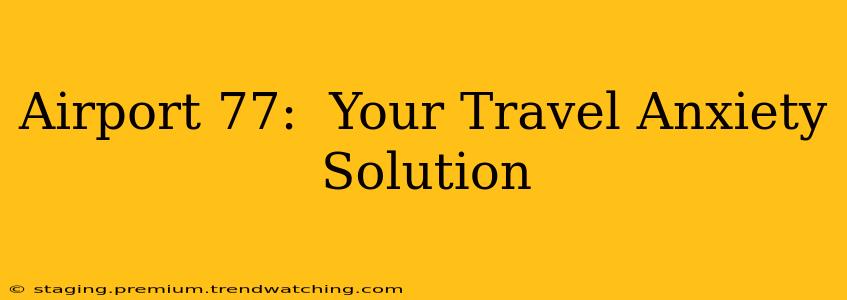Traveling can be exciting, but for many, the experience is marred by significant anxiety, particularly concerning airports. Airport 77 isn't a physical location, but rather a conceptual framework—a personalized strategy to help you navigate the often-stressful world of air travel and conquer your travel anxieties. This guide will equip you with practical tips and techniques to alleviate your worries, transforming your airport experience from a source of dread into a manageable and even enjoyable part of your journey.
What Causes Airport Anxiety?
Many factors contribute to airport anxiety. For some, it's the fear of missing a flight (FOMO), while others are overwhelmed by the crowds, security procedures, or the unfamiliar environment. Underlying anxieties about flying itself can also significantly impact the airport experience, making even the pre-flight stages incredibly stressful. The sheer number of things that can go wrong—lost luggage, flight delays, missed connections—can fuel anxiety in susceptible individuals.
How Can I Reduce My Airport Anxiety?
This is a multi-pronged approach. Let's break down strategies to help you manage and mitigate your anxiety:
Planning and Preparation:
- Thorough planning is key: Knowing your itinerary inside and out, from check-in times to gate locations, reduces uncertainty. Download your boarding pass and any necessary travel documents to your phone, eliminating the risk of losing paper copies.
- Packing light: Less baggage means less to worry about losing or managing during transit. A well-organized carry-on bag can significantly ease stress.
- Pre-check-in online: Check in online, select your seat, and print your boarding pass ahead of time. This saves time and reduces the stress of long queues at the airport.
Managing Sensory Overload:
- Noise-canceling headphones: Airports are notoriously noisy. Noise-canceling headphones can dramatically reduce sensory overload and promote relaxation.
- Sensory aids: If you're particularly sensitive to light or crowds, consider bringing sunglasses or even a small eye mask to help regulate sensory input.
- Mindfulness and breathing techniques: Practice deep, slow breaths to calm your nervous system. Mindfulness exercises can help center you amidst the chaos.
Navigating Security:
- Familiarize yourself with security procedures: Understanding what to expect during security checkpoints reduces uncertainty and potential anxiety.
- Prepare your belongings: Have your ID and boarding pass readily available, and organize your liquids in a clear, TSA-approved bag.
- Allow ample time: Rushing through security adds to stress. Arrive at the airport well in advance of your flight's departure time.
Coping Mechanisms During the Wait:
- Bring a book or download podcasts: Distracting yourself with enjoyable activities can help manage anxious thoughts.
- Engage in relaxation techniques: Meditation apps or calming music can provide a much-needed sense of calm.
- Connect with someone: Calling a friend or family member can provide a sense of support and comfort.
What if I Still Feel Anxious?
If your anxiety persists or significantly impacts your ability to travel, consider seeking professional help. A therapist specializing in anxiety disorders can provide personalized strategies and coping mechanisms to manage your anxiety effectively. They may recommend therapy techniques such as cognitive behavioral therapy (CBT) or exposure therapy.
What are Some Relaxation Techniques I Can Use at the Airport?
Several relaxation techniques can be employed at the airport. Deep breathing exercises, progressive muscle relaxation (systematically tensing and releasing muscle groups), and guided imagery (visualizing a peaceful scene) are all effective ways to calm your nerves in a stressful environment. Mindfulness meditation apps can also provide structured guidance and support.
Are There Apps to Help Manage Travel Anxiety?
Yes! Many apps offer tools and techniques to manage anxiety, including those specifically designed for travel. These apps often incorporate relaxation exercises, mindfulness techniques, and even distraction activities to help you cope with the stress of travel.
How Can I Prepare Myself Mentally for Airport Security?
Mental preparation for airport security involves understanding the process, anticipating potential challenges, and developing coping mechanisms. Visualize yourself navigating security smoothly, reminding yourself that the process is designed for safety and that everyone goes through it. Practicing deep breathing exercises before entering the security line can also help alleviate anxiety.
By employing the strategies outlined in Airport 77, you can take control of your travel anxiety and transform your airport experience. Remember, preparation and proactive coping mechanisms are key to a smoother and more enjoyable journey.

